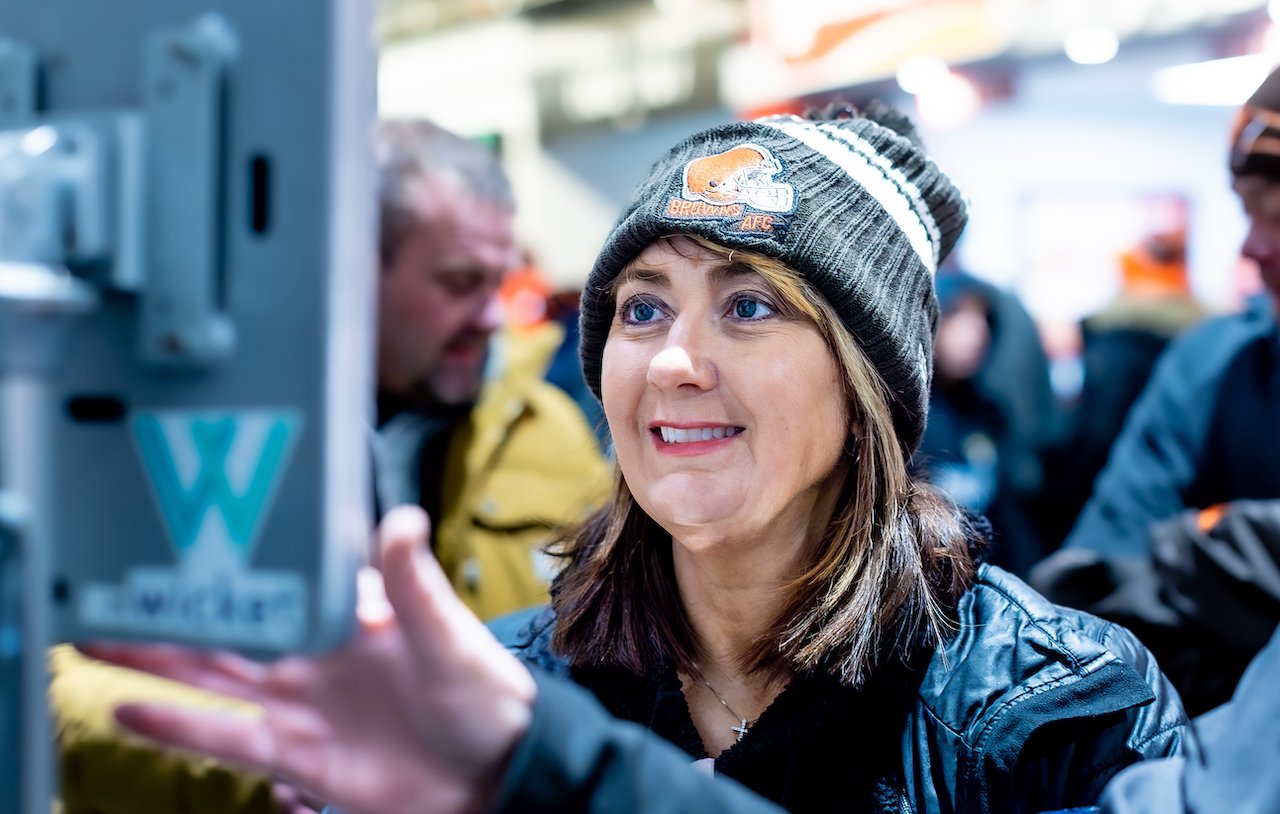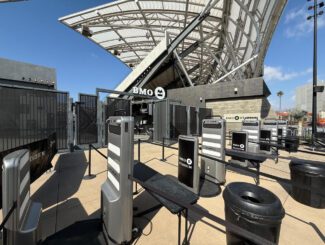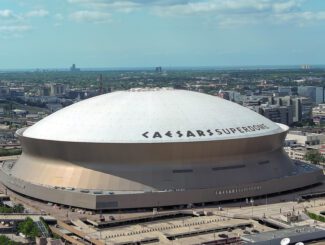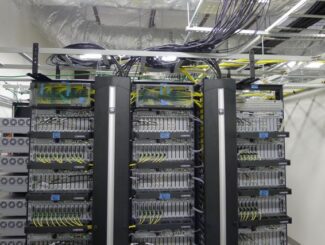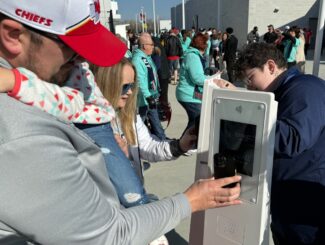For the Cleveland Browns, a test to see if facial authentication technology from a startup named Wicket could produce a faster way to get fans through ticketing gates has, in a few years, blossomed into a highly accepted solution.
With 35,000 fans enrolled in their “Express Access” facial-authentication ticketing plan that regularly supports 15 percent or more of all game-day entries, the Browns are looking to possibly make facial authentication a preferred ticket validation method for next season, according to a team executive. The team is also looking to expand concession-purchase and internal security programs that also use the Wicket technology to speed up and improve those functions.
More than 10,000 people per game used the Express Access system to gain faster entry at Cleveland Browns Stadium during the 2023 season, according to the team. Resounding support for the system in fan surveys, combined with the fact that it allows the team to have fewer staff members involved in ticket-authentication duties on game day, is prompting the Browns to put more of an emphasis on getting fans to use facial authentication going forward.
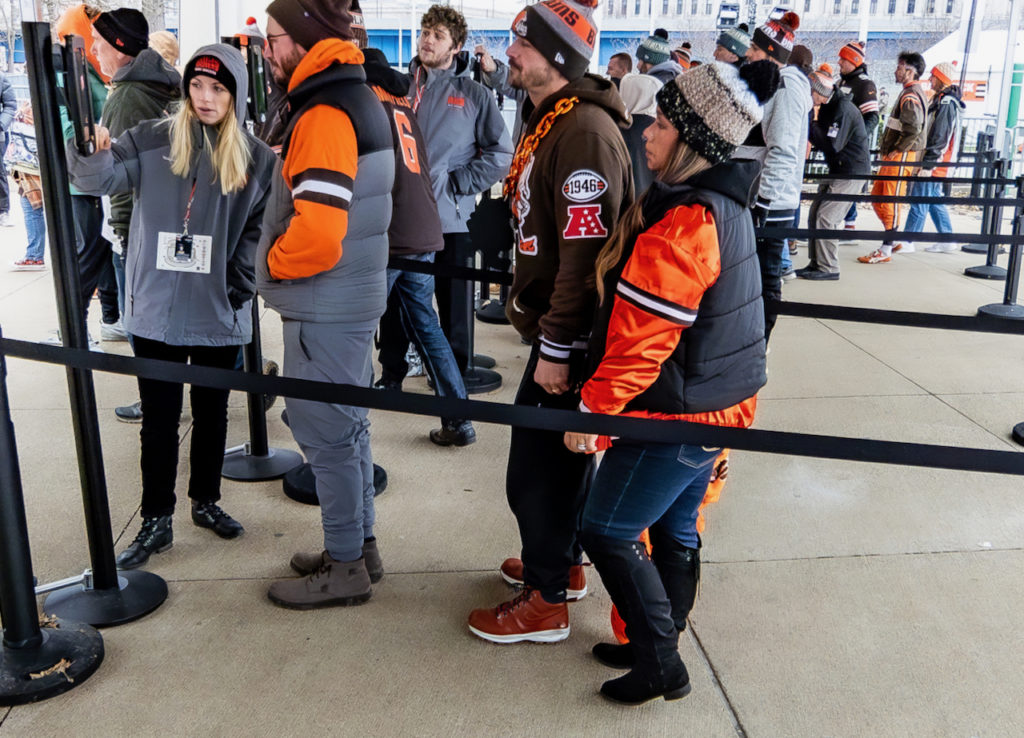
“I’m hoping we can go all in next year and make facial authentication a preferred ticketing method,” said Brandon Covert, vice president for information technology at the Cleveland Browns. “It could really ease our operations and be a better experience for everyone.”
Speeding entry while saving money
If you’re not familiar with how facial authentication works for ticketing, here’s a quick primer. Using facial authentication software from a Cambridge, Mass.-based startup company called Wicket, the Browns and Wicket built a system that allows fans to link their ticketing account to an image of their face.
An important note here is the distinction between “facial authentication” and “facial recognition,” which according to the suppliers are not equal terms. Unlike some public-safety systems that store actual facial images for comparison and verification, Wicket says its system doesn’t actually store any facial information but instead uses what it calls a “facial authentication” system, which uses artificial intelligence to map a photo of a face digitally, and uses that code to authenticate people by matching the code to a live face.
At the stadium, fans who are pre-enrolled in the program use a special entry lane where they face up to a tablet computer, which quickly recognizes them and authorizes all the tickets that person has purchased. Compared to traditional digital ticket-based entry, where fans must use a scanning pedestal or allow staff to hand-scan their devices, the facial-authentication system typically offers a much quicker verification experience. In a press release from July 2023, the Browns said that the Wicket system had an average entry time of 2 seconds per ticket, an attribute the team said allowed it to clear its entry gates 10 minutes faster on average.
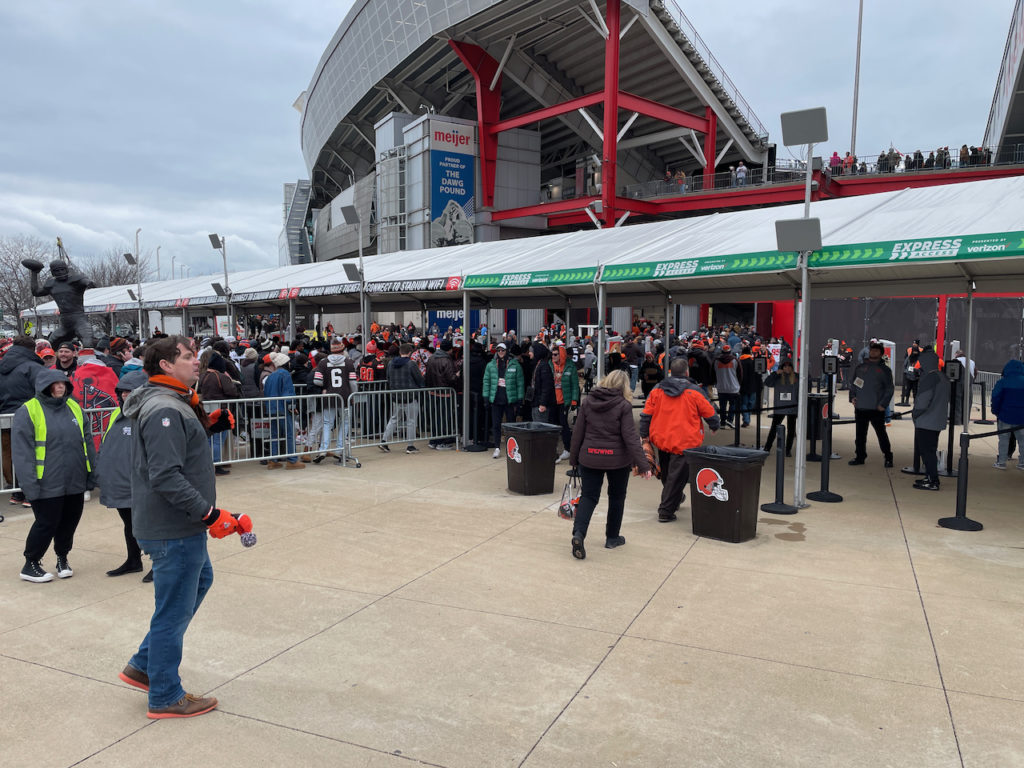
In addition to the ticket purchaser, any friends and family members using other tickets from the same account can also quickly walk through the gate behind the purchaser, speeding up the entry process even more. From that same press release, the Browns said one Wicket-powered lane could replace four traditional entry lanes, producing a labor and operational savings of $8,000 per Wicket lane deployed.
“It took us a couple years to go from, ‘this is a cool thing’ to ‘this is really impactful,’ ” said Covert. “But the technology has been proven. During the season, we were doing 1,000 new signups a week.”
From a Covid-era test to a viable alternative
Like many other digital forays in the stadium operations world, the Browns’ program with Wicket was born during the Covid era, when fans and teams were looking for ways to limit personal contacts.
“In 2020, nobody wanted to touch things,” Covert said. “Nobody wanted someone else to grab their phone, which is what you did with handheld ticket scanners, since it was the best way to hold the device to scan the ticket.”
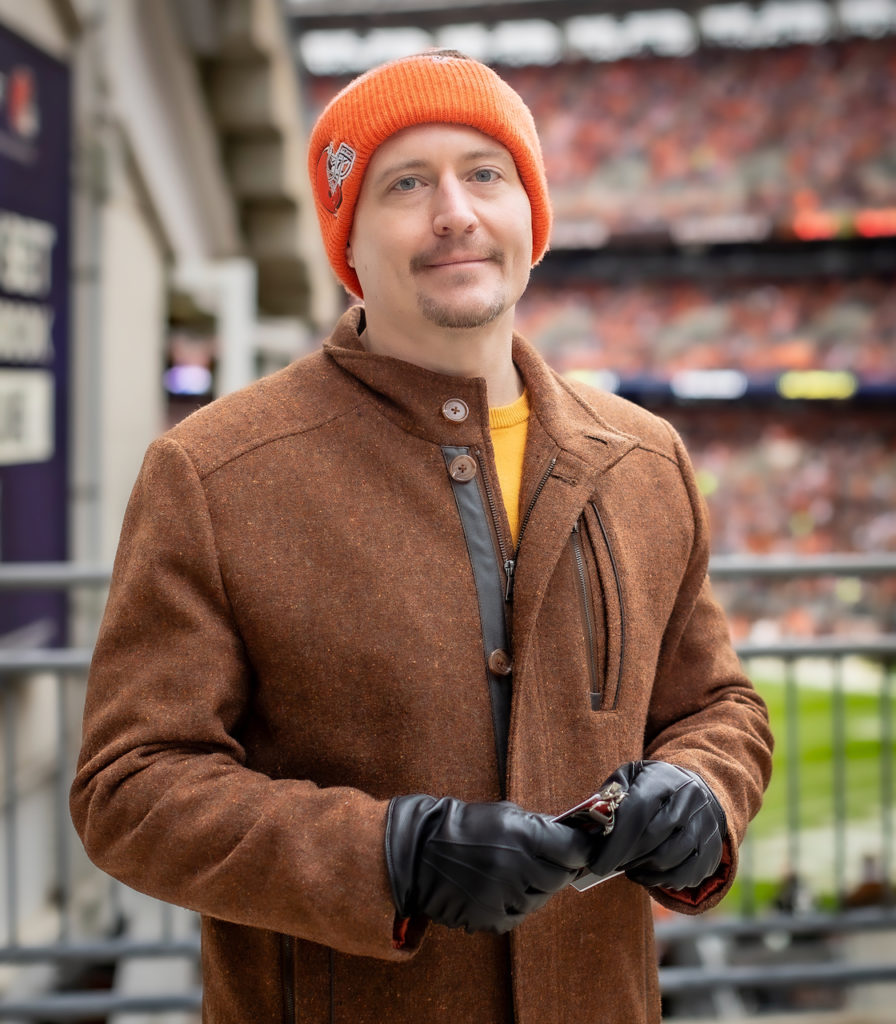
Following a recommendation from a team staff member, the Wicket software was given a test and was determined to be the best option of the facial-authentication methods available. After doing some software integration to get the team’s Ticketmaster program working with the Wicket systems, the Browns tried a test at a 2020 game with 50 fans and said it passed with flying colors.
“After the first pilot game the positive feedback was unanimous, and that never happens,” Covert said. “That gave us the fuel to go forward.”
With compliments both to Ticketmaster (“we didn’t know if they would allow us to do this”) and Wicket (“they really bent over backwards to make this work”) the Browns started aggressively promoting the “Express Access” program the next season, sometimes coupling it with walk-through security scanners from another startup called Evolv that made the facial-authentication lines much shorter than the traditional scanning lines.
By the end of the 2022 NFL season the Browns said they had 21,000 fans enrolled in the Express Access system, with approximately 6,000 using the Wicket entry gates at each game. The team even installed a CBRS network in the vicinity of its two main entry gate areas, so that the Wicket systems didn’t have to compete with the Wi-Fi network at those locations.
Now known as the “Express Access presented by Verizon,” the system had a bit of a hiccup at the start of the 2023 season when an outage kept the facial authentication systems from working at the first regular-season game at Cleveland Browns Stadium.
“That was an awful experience, but it has worked near perfect since then,” Covert said. “The fans were upset but luckily we had a few years under our belt and our fans knew it was an outlier-type event.” According to Covert, for the rest of the 2023 season the number of fans using Express Access was a steady 10,000-plus per game, about 15 percent of all attendees.
According to Wicket, its systems have been used for more than 1 million stadium entries so far, including at Cleveland Browns Stadium as well as at other NFL and other professional sports venues, including the New York Mets’ Citi Field and Merecedes-Benz Stadium, home of the Atlanta Falcons. Through the 2023 NFL season, Wicket and Verizon paired up for several trials of the “Express Entry” technology at several other NFL stadiums, including the Tennessee Titans’ Nissan Stadium and the Carolina Panthers’ Bank of America Stadium. Major League Soccer’s Columbus Crew, owned by the same family that owns the Cleveland Browns, also was an early user of the Wicket ticketing system.
Hardest part of innovation is getting people to sign up
On game day, the worth of the facial-authentication system is an easy sell, especially when fans look at the short or non-existent lines at the Wicket gates right next to the longer lines at the traditional gates. The only problem is, it’s tough to sign up for the system on the spot because to enroll, a fan needs to go through several steps, including taking a selfie and then linking that photo to an existing Ticketmaster account. Right now, the process is much easier when done at home, but the team and Wicket are both committed to solving the problem.
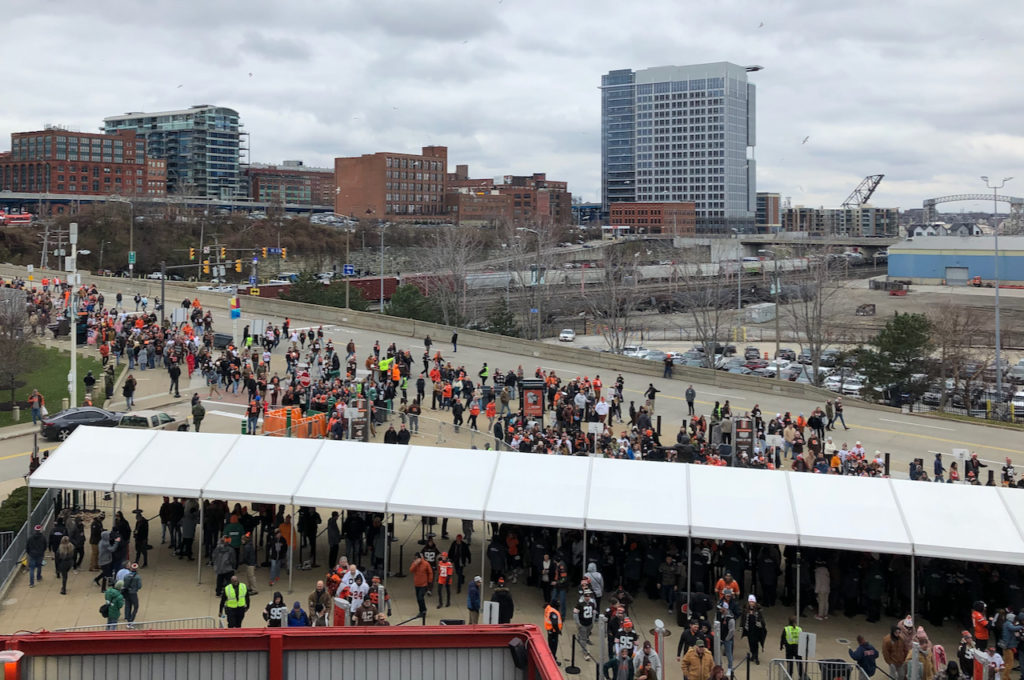
“The big challenge is how do you get people into the system the first time,” said Alastair Partington, Wicket’s CEO. “Can we really streamline the process?”
Even though the team regularly sends out emails and “know before you go” pregame alerts to Cleveland Browns fans to promote the systems, Covert knows that such messages can get glossed over. Then there is the fact that many people who come to games only come to one or two a year at most, meaning that they may not know about the system until they see it live. And then it’s usually too much of a hassle or there’s not enough time to sign up.
“Nobody wants to enroll while they’re waiting in line, having to accept terms and do all that,” said Covert, who said the team is exploring faster possibilities, like a standalone kiosk that could let fans sign up quickly at the stadium.
But even with the challenges, Covert thinks that putting more emphasis on the facial-authentication systems it has in place, including those for concessions, could really improve the game day for fans and the team.
“We are going to need some really solid marketing but I think this could really ease our operations, and be better experience for everyone,” Covert said of the facial-authentication deployments.
“It could be a full journey where the fan comes in, gets food and drink, and never has to reach into their pocket,” Covert said. “That’s kind of exciting to think about.”
Next: Facial authentication for faster beer purchases takes off in Cleveland



